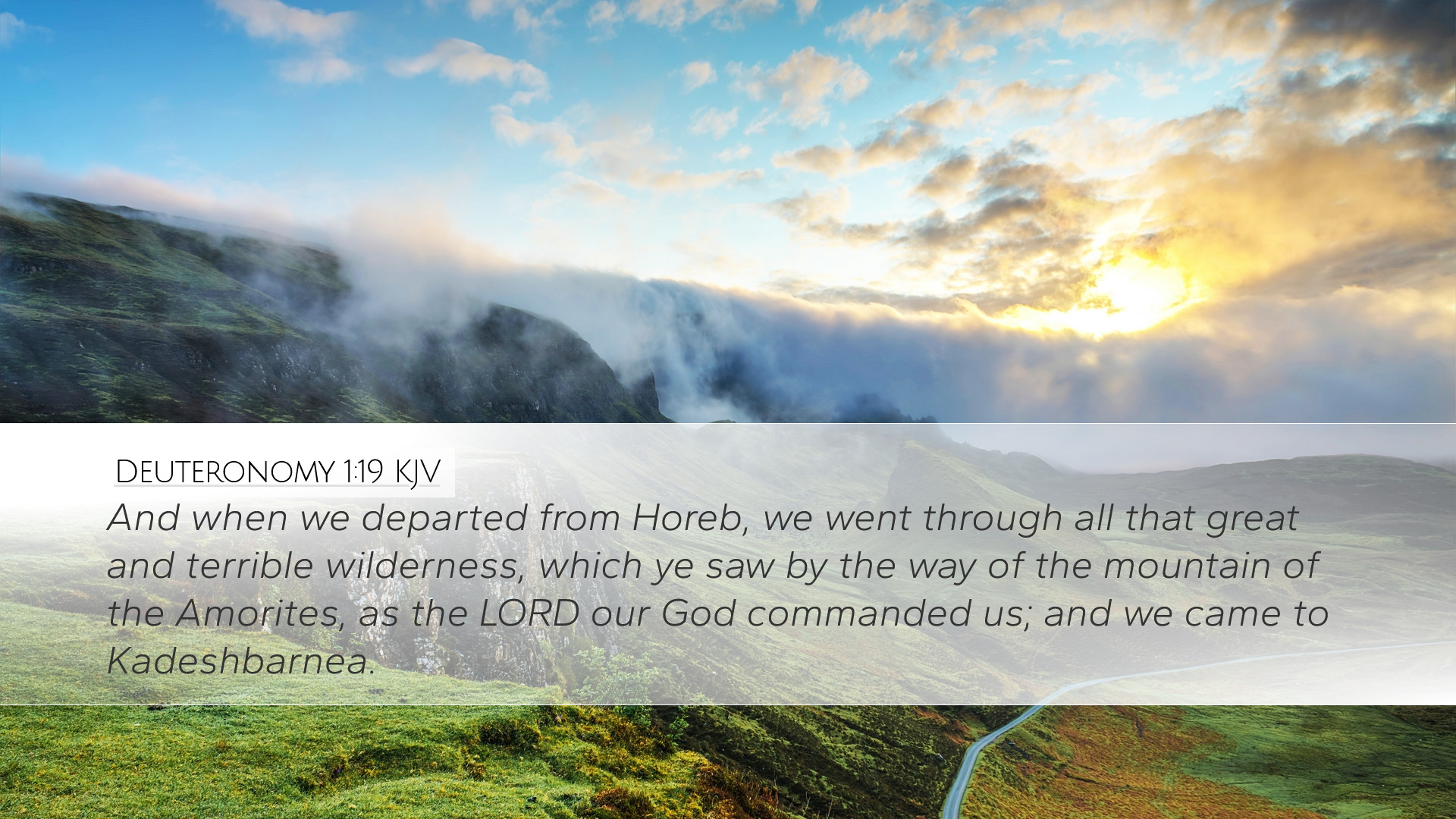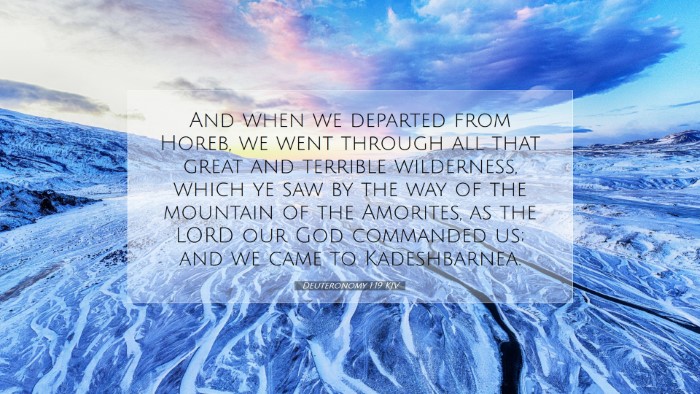Commentary on Deuteronomy 1:19
Verse: "Then we set out from Horeb and went through all that great and terrible wilderness, which you saw on the way to the hill country of the Amorites; as the Lord our God commanded us; and we came to Kadesh-barnea."
Introduction
This verse marks a pivotal moment in the narrative of the Israelites, as they begin their journey from Horeb (Sinai) into the wilderness. It is essential to understand the implications of this passage not only in its immediate context but also in relation to the overarching themes of obedience, faith, and divine guidance in the life of God's people.
Contextual Background
The Israelites find themselves at a significant crossroads, having received the Law at Sinai and now poised to enter the Promised Land. The wilderness journey is fraught with trials and challenges, symbolizing both the physical difficulties and the spiritual testing of the people. This commentary draws on insights from Matthew Henry, Albert Barnes, and Adam Clarke to unveil deeper meanings behind the text.
Matthew Henry's Insights
Matthew Henry emphasizes the contrast between the glorious experiences of receiving the Law and the daunting wilderness journey. He highlights the following points:
-
The Great and Terrible Wilderness: Henry points out the wilderness serves as a reminder of the hardships that the Israelites would face. It reflects God's testing and purifying of His people, as they must learn to rely on Him alone.
-
God's Command: The phrase "as the Lord our God commanded us" underscores the necessity of obedience. Henry underscores that while the journey may be challenging, faithfulness to God's instructions is paramount.
-
Spiritual Lessons: The point of arriving in Kadesh-barnea is that it represented both a potential entry into the Promised Land and a moment of decision that would lead to future ramifications based on the Israelite's obedience or disobedience.
Albert Barnes' Perspective
Albert Barnes provides valuable insights on the geographical and historical context of the verse. He notes:
-
Horeb's Significance: Horeb was more than just a geographical location; it was the place where the covenant was established and reflects the transformative moment in Israelite history.
-
Importance of Memorization: Barnes mentions the need for the Israelites to remember their past encounters with God, which serve to strengthen their faith during difficult times ahead.
-
Contrast with Future Failures: The journey into the wilderness is a mixed blessing; it is both a journey towards promise and a testing ground that, sadly, would lead to failure for many of the Israelites due to their rebellion.
Adam Clarke's Commentary
Adam Clarke's analysis focuses on the theological implications of the journey and what it symbolizes for believers today:
-
Wilderness as a Metaphor: Clarke describes the wilderness as representing the trials faced by Christians in their journey of faith. He asserts that these trials are essential for spiritual growth and maturity.
-
Moral Responsibility: Clarke stresses the concept of individual responsibility before God. The readiness to heed God's commands is crucial, as it lays the foundation for the community's spiritual health.
-
Anticipation of the Promised Land: The anticipation of reaching Kadesh-barnea signifies hope and the culmination of a long journey, echoing the ultimate hope of believers in reaching spiritual maturity and communion with God.
Thematic Reflections
Multiple themes emerge from this verse, offering rich ground for reflection:
-
Obedience to Divine Direction: The Israelites' journey illustrates the necessity of obedience to God's guidelines in navigating life's wilderness, highlighting the importance of aligning actions with divine will.
-
Endurance in Trials: The wilderness symbolizes the trials and tribulations that believers face. It is through these experiences that faith is tested and strengthened.
-
The Importance of Memory: Remembering past mercies and interventions by God helps to cultivate hope and perseverance in the face of challenges.
-
The Significance of Transition Moments: The transition from Horeb to Kadesh-barnea is crucial in understanding the broader narrative of redemption. Kadesh-barnea represents a point of choice and consequence, emphasizing the necessity of readiness to respond to God's leading.
Conclusion
Deuteronomy 1:19 encapsulates the trials of faith and the call to obedience that resonate through the generations. This commentary serves to encourage pastors, students, theologians, and Bible scholars to draw from the wisdom of historical exegesis and theological reflection. It invites believers to consider their own wilderness journeys, how they respond to God’s commands, and what awaits them at their Kadesh-barnea.
Final Thoughts
The journey through the wilderness is illustrative of the broader narrative of the human experience. As we grapple with the challenges and uncertainties of life, this passage serves as a profound reminder of God’s faithfulness, the importance of obedience, and the assurance that at the end of the journey lies the fulfillment of His promises.


